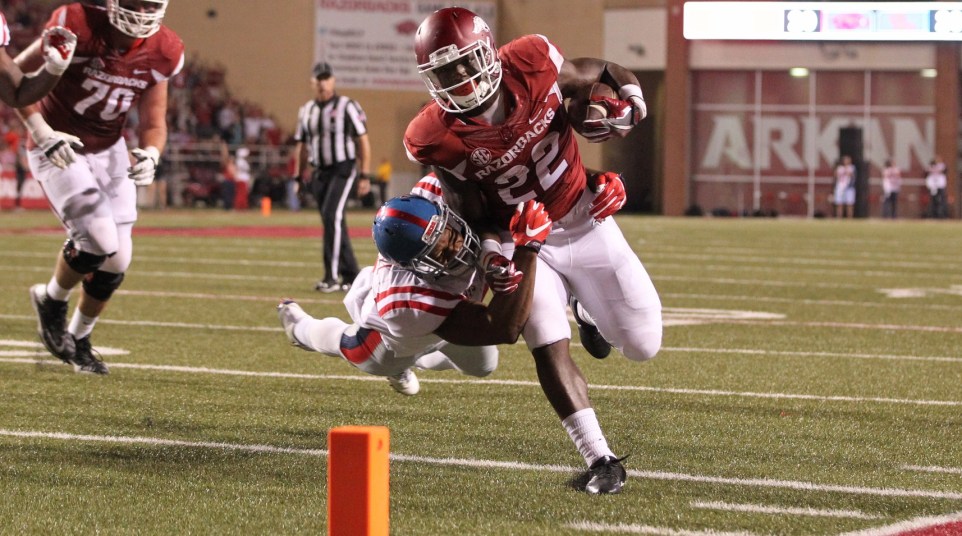
Rawleigh Williams III most recent back to find success in Bret Bielema's scheme
If there’s one thing you can expect from Bret Bielema’s teams, it’s a strong running game.
Throughout his career, the coach has led successful rushing attacks. At Wisconsin, Bielema’s teams succeeded by using three running backs, which included FBS rushing leaders Montee Ball and Melvin Gordon, who played for the coach during his first two seasons before leading the nation in 2014.
In 2010, John Clay and James White both rushed for more than 1,000 yards, while Ball recorded 996 and led the Badgers with 18 touchdowns. Two years later, Ball led Wisconsin with 1,830 yards — third in the FBS — while White finished with 806 and Gordon tallied 621.
That trend continued during Bielema’s tenure at Arkansas. In 2013, his first season as the team’s head coach, freshman Alex Collins rushed for 1,026 yards, while sophomore Jonathan Williams recorded 900. The two backs each recorded more than 1,000 yards the following season, with Williams besting Collins by a 1,190-1,100 margin and each finishing with 12 touchdowns, respectively.
Collins and Williams split carries during their first two seasons as teammates and became one of the most dominant rushing tandems in the SEC. But after Williams experienced a season-ending foot injury prior to Arkansas’ 2015 season opener, Collins carried the load as the team’s primary back. The junior led the Razorbacks with 1,577 yards and 20 touchdowns on 271 carries before declaring for the NFL Draft last January.
Many anticipated Collins’ decision to forego his senior season, which put emphasis on Arkansas’ backup tailbacks throughout the 2015 season.
At first, true freshman Rawleigh Williams III shined as the No. 2 option behind Collins. Williams recorded 254 yards and a touchdown on 56 carries during his first seven collegiate games before experiencing a season-ending neck injury.
Junior Kody Walker stepped up in his absence as the team’s No. 2 running back. During the offseason, many speculated which back would emerge as the team’s primary option.
So far, it’s been all Williams who leads the SEC with 785 yards, along with 5 touchdowns on 140 rushing attempts and is averaging 5.6 yards per carry. The sophomore also recorded a career-best 180 rushing yards during Saturday’s win over Ole Miss, which earned him SEC Offensive Player of the Week honors.
But again, that shouldn’t be much of a surprise given Bielema’s track record of successfully grooming running backs. It’s nearly guaranteed that running backs will pan out in the coach’s offensive scheme, but even more so with the sophomore sensation.
Williams is the ideal size for a Bielema running back. At 5-foot-10, 233 pounds, he’s nearly a clone of Collins and Ball and possesses a similar skill set. That much has been shown as the sophomore has looked almost identical to his former teammate Collins in 2016.
But let’s not discredit freshman Devwah Whaley as a solid No. 2 option. Whaley has rushed for 306 yards and a touchdown while averaging 6.2 yards per carry. Having several capable backs is still the biggest factor to Bielema’s successful rushing attack. Williams is inarguably the primary option, but the team is still capable of gaining yards when he’s on the sideline, which allows him to recover between reps.
Not only is that crucial to his sophomore season, but also for his success long-term. We’ve seen plenty of backs carry too much of a load at the college level and burn out early in their college careers.
Though Williams is second among SEC backs in rushing attempts, he’s still not being overworked. If the Razorbacks can keep him healthy, he should continue to find success in Fayetteville.
Both Williams and Bielema deserve credit for continuing the annual trend of standout Arkansas backs during the coach’s tenure. Though the philosophy has produced consistent success, Williams provides the perfect fit to flourish in it and deserves his sudden recognition as one of the SEC’s best backs.
